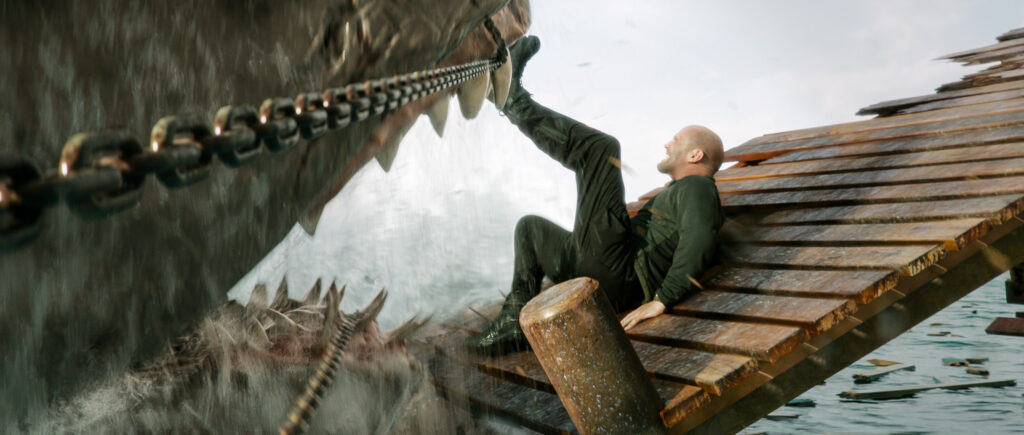August 3, 2023
by Carla Hay

Directed by Ben Wheatley
Culture Representation: Taking place in China and in or near the Pacific Ocean, the sci-fi action film “Meg 2: The Trench” (a sequel to 2018’s “The Meg”) features a predominantly white and Asian cast of characters (with a few African Americans and Latinos) representing the middle-class, working-class and wealthy.
Culture Clash: Deep sea diver Jonas Taylor and his colleagues once again battle deadly creatures in or near the Pacific Ocean.
Culture Audience: “Meg 2: The Trench” will appeal primarily to people who are fans of the movie’s headliners and “The Meg,” but “Meg 2: The Trench” replaces the campy fun of “The Meg” with an onslaught of terrible filmmaking.

Even by low standards of stupid movies about animal attacks, “Meg 2: The Trench” is among the lowest of the low when it comes to idiocy. The movie also goes into a weird tangent of showing dinosaurs as much as sharks. “Meg 2: The Trench” (a sequel to 2018’s “The Meg”) is one of those moronic movies where people are supposed to be 25,000 feet underwater in the ocean, but they are able to survive without oxygen tanks and helmets. At one point, this vital survival equipment is discarded by the movie’s chief “hero” because this equipment just gets in his way when he was to travel across the ocean floor.
Apparently, getting “the bends” (getting injured from rising to the surface too quickly after being deep underwater) doesn’t exist in this world either. In “Meg 2: The Trench,” people who were 25,000 feat underwater are able to rise to the surface with no physical side effects. And apparently, face makeup stays intact for the women in the movie, despite all the life-threatening chases they go through underwater and above water. “Meg 2: The Trench” is based on Steve Alten’s 1999 novel “The Trench,” which is by far much better than the obnoxiously inept movie version of the book.
Directed atrociously by Ben Wheatley, “Meg 2: The Trench” is a giant mess of incoherence, with film editing so sloppy, it’s mind-numbing. Characters are “trapped” in one scene, but then in the next scene, the characters are suddenly “free,” with the movie quickly skipping over the details of how they escaped. One minute these people are stuck 25,000 feet underwater. The next minute, the survivors are in a canoe, with no signs of having medical problems from their ordeal. The movie doesn’t even bother to show them in wet clothes after rising from deep within the ocean.
The movie’s title character refers to the Megalodon shark (more than 60 feet wide), which is extinct in real life. But in the “Meg” movies, more than one Megaldon shark exists. “The Meg” was based on Alten’s 1997 novel “The Meg: A Novel of Deep Terror.” “Meg 2: The Trench” has very little resemblance to the novel on which it is based, in terms of the human characters. “Meg 2: The Trench” screenwriters Jon Hoeber, Erich Hoeber and Dean Georgaris butchered “The Trench” novel to come up with this awful screenplay.
In addition to battling Megaldon sharks, the human characters in “Meg 2: The Trench” have to contend with two fictional creatures that attack humans: (1) a giant octopus with the not-so-original name Mega-Octopus and (2) snappers (inspired by a dinosaur called Koreanosaurus) that look a lot like mutant iguanas that are about the size of sea lions. And then there are the movie’s human villains, led by Hilary Driscoll (played by Sienna Guillory), the wealthy CEO of a company that mines the ocean for resources.
“Meg 2: The Trench” takes place in and near China, but the movie was actually filmed in England and Thailand. Warner Bros. Pictures is co-distributing this movie with China-based CMC Pictures. “Meg 2: The Trench” begins by reminding viewers that dinosaurs lived 65 million years ago, but some of these dinosaurs were no match for a Megaldon shark. This opening scene shows a Meg attacking and devouring a smaller-sized dinosaur. In the “Meg” world, several animals that are supposed to be extinct are still alive in the 21st century.
The main protagonist in “The Meg” and “Meg 2: The Trench” is Jonas Taylor (played by Jason Statham), a British diver whose specialty is deep-sea search and rescue. Jonas is also an environmental activist who’s hired to bust up operations that violate environmental laws in large bodies of water. Near the beginning of the movie, Jonas is shown narrowly escaping from a cargo ship, where he was discovered as an intruder. Some goons chase him around the deck. And when Jonas is cornered, he jumps over the ship’s railing and plunges into the water unharmed.
Meanwhile, the other “alpha male” in “Meg 2: The Trench” is Jiuming Zhang (played by Wu Jing), the director of the Zhang Oceanic Institute in Hainan, China. His domineering father is well-known oceanographer Minway Zhang (played by Winston Chao), who’s not in “Meg 2: The Trench,” but he was in “The Meg.” Even though Jiuming is a respected oceanographer in his own right, Jiuming feels like he’s living in his father’s shadow. Jonas and two of his closest colleagues—dependable James “Mac” Mackreides (played by Cliff Curtis) and sassy Rigas (played by Melissanthi Mahut)—attend a reception where Hilary is honoring Jiuming, whom she wants to work with to find parts of the ocean that will be lucrative for her company.
As shown in “The Meg,” Minway and his oceanographer daughter Suyin Zhang (played by Li Bingbing) supervised an exploratory mission in the Mariana Trench (located in the western Pacific Ocean, near Asia), with Jonas on board for the mission, which turned out to be a deadly disaster involving attacking Megalon sharks. The vessel used in this fatal mission was the Mana One, which also doubled as an underwater research facility where single mother Suyin lived with her 8-year-old inquisitive daughter Meiying (played by Sophia Cai)—because nothing says “family bonding” like having an underage kid along for the ride in a dangerous underwater mission.
In “Meg 2: The Trench,” Suyin is now deceased. Meiying (also played by Cai), who is now 14 years old, is under the guardianship of Jonas, who treats Meiying like a daughter. Meiying wants to become an oceanographer, just like her mother, uncle and grandfather. “You need to take me seriously as a scientist,” Meiying tells Jonas when he says she can’t go with him on his next exploratory mission. And you know what that means: Meiying sneaks on the submarine where Jonas and his crew are doing their mission, once again in the Mariana Trench.
At the Mana One Research Center, the control room that is monitoring this mission is being operated by managing researcher Mac, level-headed engineer Jess (played by Skyler Samuels) and wisecracking engineer DJ (played by Page Kennedy), who is written like a buffoon and is saddled with some of the worst “jokes” in the movie. Mac and DJ were also in “The Meg,” so they already have an established bond. Most of the Mana One supporting characters who are new to “Meg 2: The Trench” are bland and have forgettable personalities.
Jonas is leading two submarines for his mission, which is going 25,000 feet underwater in the Mariana Trench. The submarine with Jonas on board also has Jiuming, surprise passenger Meying and crew members Rigas, Curtis (played by Whoopie Van Raam) and Sal (played by Kiran Sonia Sawar) and Lance (played by Felix Mayr). Viewers don’t really get to know the people in the other submarine, so you know what that means in a movie where groups of people can get killed at the same time.
Something goes terribly wrong when giant rocks surge through the ocean in a collision that crashes both submarines. Guess which ancient and monstrous shark caused this disruption? The submarine with Jonas and his crew is damaged but has no fatalities. There are no survivors on the other submarine, which has been completely demolished.
Making matters worse, although Jonas can communicate by radio to the Mana One Research Center’s control room, the control room’s radar to detect the sunken submarine is no longer working. Mac soon finds out that the radar’s system has been hacked into and destroyed. The people trapped underwater are running out of oxygen. Jonas makes the risky decision to walk the three kilometers (approximately 1.9 miles) across the trench to see if he can find anything to help them get back up to the surface.
A lot of people might think that “Meg 2: The Trench” takes place mostly underwater. They’ll be surprised to find out that at least half of the movie takes place on land, where there are more monstrous and human-killing creatures: the snappers. In typical villain fashion, Hilary has a chief henchman doing a lot of her dirty work. His name is Montes (played by Sergio Peris-Mencheta), who has a grudge against Jonas that is revealed in the movie.
Much of the last third of “Meg 2: The Trench” takes place in the South Seas, on Fun Island, which has a popular resort called Club Paradise. Fun Island is populated by numerous snappers, but apparently the people at Club Paradise had no idea until one particular day when the snappers attack. And let’s not forget that Mega-Octopus is lurking around too.
Club Paradise social director Coco (played by Sui Fong Ivy Tsui), who was a bride in “The Meg,” has her constant companion with her: a Yorkshire Terrier named Pippin. This dog is used as comic relief in the movie and in the marketing campaign for “Meg 2: The Trench.” But in actuality, the dog’s screen time in “Meg 2: The Trench” is less than 10 minutes. It’s “bait and switch” manipulation.
There are so many cringeworthy and eye-rolling things about “Meg 2: The Trench,” it’s as if the filmmakers decided to take everything that people dislike about mindless action flicks and put all of it into this movie. People don’t mind cheesy dialogue if it’s done with the right tone, but “Meg 2: The Trench” can’t even have fun with its foolishness. When one of the villains gets killed by shark, Jonas utters, “See you later, chum.” (If you don’t know the sea creature definition for chum, look it up.) It’s supposed to be the biggest joke in the movie, but this “joke” just falls flat.
Needless to say, between the unfocused direction, the horrible film editing, the mediocre-to-terrible acting, and the junkpile screenplay, “Meg 2: The Trench” is not the type of bad movie that’s somewhat entertaining to watch. It’s just a series of awkwardly cobbled-together scenes where action sequences look jumbled and the visual effects often look amateurish. “Meg 2: The Trench” soon becomes a blur of nonsense, because this movie just doesn’t care about having a good story. If you want action movies to at least have a good story, then you shouldn’t care to see “Meg 2: The Trench.”
Warner Bros. Pictures will release “Meg 2: The Trench” on August 4, 2023.


